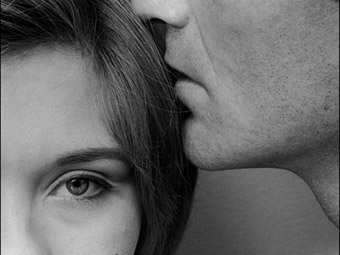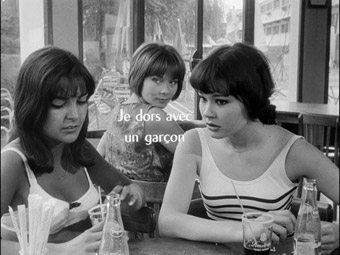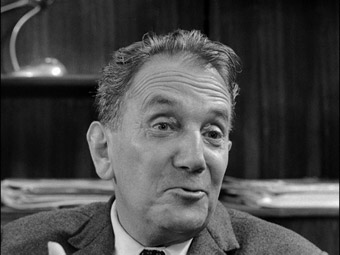|
Jean-Luc Godard is one of those widely revered filmmakers that I haven't quite made my mind up about yet, and possibly never will. Much of his early work is unquestionably ground-breaking, influential and thrillingly vibrant, but I've yet to connect with some of his post-Weekend pieces on any more than the level of academic curiosity. I'm also aware that my response to much of his work tends to be intellectual rather than emotional. Of course, this may well be deliberate and certainly fits with one of the director's famed quotes, when he said: "I don't think you should feel about a movie, You should feel about a woman. You can't kiss a movie."* But there's nothing wrong with that. There's a very specific charge that comes from having your intellect excited, if you'll pardon the term, and Jean-Luc certainly does that, to the degree that at times prompts a unique emotional response of its own (the café dance in Bande à part, that insane traffic jam shot in Week-end, the ending of Pierrot le fou, etc). It's a sensation I experienced more than once during his somewhat literally but still intriguingly titled Une femme mariée: Suite de fragments d'un film tourné en 1964 en noir et blanc [A Married Woman: Fragments of a Film Shot in 1964 in Black and White].
The first sequence is a case in point. Playing like an art-house take on the opening scene of Psycho by way of old school Vogue and Ingmar Bergman, and yet at the same time like none of them, it introduces us to two of the main characters – the elven Charlotte and her lover Robert – though a series of exquisitely lit and framed close-ups (the work of Godard regular Raoul Coutard) as they interact in various states of undress in the hotel room in which they are conducting their affair. Relationship conversation gives way to Charlotte's staccato thoughts about her life and situation, and we are left to ponder on whether to take these images of her at face value or as a comment on the media presentation of the female form as an object of beauty and desire. As the film progresses, the pointers do clarify, as Charlotte becomes caught up in measuring her bust to see if it matches a magazine definition of perfection, and is later assaulted by page after page of underwear advertisements aimed at shaping the female form into a (narrow) male ideal, a sequence that wittily concludes with her dwarfed by a gigantic billboard image of the same.

In a reverse of the norm, it's not Robert but Charlotte who is dividing her affection between her partner and a lover, something that is niftily revealed when she parts company with the latter and darts across town to meet up with her son and husband, whom she regails with tales of a busy morning spent on household chores. It's with husband Pierre, a commercially minded and globe-trotting businessman whose concept of ownership extends to his attitude to his wife, that the film's emphasis on the visual becomes secondary to the dialogue, as characters express their views on memory, the present, intelligence and sex in long held, single-shot, chaptered monologues. Even Charlotte's young son gets a look-in here with a brief address to camera about childhood, one of a number of moments that suggest Godard is actually having fun as well as making a point.
True to its title, Une femme mariée plays less as story-driven drama for emotional response than a collection of theories and observations for reflection and debate. Its sketchbook approach utilises a number of cinematic techniques in turn without settling on any as the overriding style. Thus, the careful compositions of the opening scene soon give way to mobile wide shots, long-held close-ups and even the more conventional angles and edits of scene construction, while more experimental techniques are briefly flirted with in the shape of dramatic camera tilts and brief switches to negative imagery. Scenes are intercut with text from newspapers, magazines and advertising in a focussed questioning of the increasing role of commercialisation and advertising in daily life, and in a sequence that pre-dates a well-known trick employed by Woody Allen in Annie Hall by some years, an overheard conversation is accompanied by text that conveys the silent interpretation and thoughts of the listener. There are even a few fleeting moments of self-portrait tucked into the character and detail, in the lingering cutaway to a poster of Hitchcock, in Charlotte's positioning herself low in a car seat because it's ideal position for watching films, in her secret meet with Robert in a cinema screening Resnais' Night and Fog, and in Robert's reaction to Charlotte's claim that she prefers Hollywood movies because the actresses shave their armpits. "I find it prettier," she says, to which Robert responds, "Yes, but less exciting."

For Godard devotees and hardened cineastes, all this has proved a launching point for the sort of deconstruction of elements that interpretation-heavy film books are grown from, a flavour of which you'll find in the roundtable discussion in the accompanying booklet. I'm genuinely uncertain whether I buy into this or not, as while the observations made there by Krohn, Moullet and Keller are all potentially valid, it's also the sort of interpretive reading that a skilled wordsmith could apply to just about any film you care to pick out of the viewing hat (I've sat with a media class for a couple of hours and between us we compiled six closely typed A4 pages of well-argued meaning out of just two short trailers for Requiem for a Dream). And just how much meaning it's safe to read as intentional into a film that was written in one week, shot in four, and edited in five is open to question itself. But at no point does the result feel rushed or loosely improvised, and the precision of its execution can't help but suggest a purpose to every cut and composition, albeit one that is often left for the viewer to decode.
I remain in two minds about Une femme mariée, whose experiments with form and approach are exciting in themselves but for me do not quite constitute a completely satisfying or satisfyingly complete whole. But there's a great deal here to tickle the cineaste intellect and it's fascinating alone for its location in Godard's oeuvre, made the same year as his justly celebrated Bande à part and prefiguring elements of later films such as 2 ou 3 choses que je sais d'elle [Two or Three Things I Know About Her]. It's best sequences are still skin-pricklingly good, and the film as a whole serves as a compelling reminder that a a series of detailed sketches, especially ones as finely crafted as this, are sometimes more interesting and revealing than the completed painting.
A gorgeous 1.37:1 transfer with a lovely tonal range – the opening scene compositions have all the subtlety and detail of any magazine-printed still-life equivalent. Sharp without obvious edge enhancement and with a contrast range that doesn't sacrifice shadow or highlight detail, this is how monochrome DVD transfers should look.
A clean Dolby mono 2.0 soundtrack that delivers on clarity and makes only moderate range concessions to age.
The disc extras are restricted to the Original French Trailer by Godard (3:47), but this is a rare treat in itself, seeing how few film trailers are put together by the director of the feature they are promoting, and given Godard's status this will doubtless be studied as a work in its own right. Deliciously edited to a very French beat, it both captures the flavour of the film and acts as a most persuasive sell without including a word of dialogue or narration or revealing anything much about the content.

The real meat here sits in the accompanying Booklet, which is substantial enough here to almost drop the 'let' part of that product description, weighing in at 80 packed pages, most of which is in small type text. This is the sort of collective writing that's guaranteed to make anyone who is not completely in love with the film feel like they've really missed something and convince them that someone is just waiting to tear up their cineaste membership card. It includes an introduction (or Overture) by Luc Moullet, the above-mentioned roundtable discussion between Luc Moullet and MoC favourites Bill Krohn and Craig Keller, a very detailed essay on the film entitled Une Femme mariée from Deleuze to L'Herbier by Bill Krohn, a statement on the film by lead actress Macha Méril, a transcript of a lecture given by Godard, excerpts from Bérénice by Jean Racine, and some final words by Craig Keller and Andy Rector, as well as the usual stills and credits. It's a hell of a collection that would justify a reasonable price tag as a stand-alone product. Whether you buy into all of the points being made is another thing, but they make intriguing reading.
A fascinating and intermittently exciting experiment whose best moments – the opening and mid-film hotel interactions are delicious filmmaking that sit among my favourite JLG sequences – really are worth the admission price alone. The Masters of Cinema DVD may have only one on-disc extra, but the transfer is lovely and the booklet is one of MoC's best. Recommended, and for Godard devotees it should be considered an essential purchase.
* In the interest of playing devil's advocate to counterpoint Godard's statement, I offer one made by John Carpenter early in his career that I am unable to locate the source of at present: "My whole philosophy of movies is that movies are not intellectual, they are not ideas, that is done in literature and all sorts of other forms. Movies are emotional, an audience should cry or laugh or get scared. I think and audience should project into the film, into a character, into a situation and react."
|